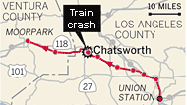Teacher responses to the 2010 release
The following is a list of teacher responses to their "value-added" ratings during the intial release in 2010. See the most recent responses »
The Times gave LAUSD elementary school teachers rated in this database the opportunity to preview their value-added evaluations and publicly respond. Some issues raised by teachers may be addressed in the FAQ. Teachers who have not commented may do so by contacting The Times.
|
|
 Delicious
Delicious
|
 Digg
Digg
|
 Facebook
Facebook
|
 Twitter
Twitter
|





I have no idea how this was calculated. Every year, I add how many points I raise a class. I subtract for the few who students who went down. Every year, in both english and math, I have raised my class more than 800 points, for a total of at least 1600 in both subjects. How this calculates to overall "average" is beyond me. It's unfortunate, also, that this year's scores were not included, as 18/30 students moved to advanced in math and 13/30 went to advanced or proficient in English, most of whom started at below basic. If the entire class points were added, I raised the class 2000+ points this year. Additionally, the love and attention that I provide for students is certainly not "overall average." Will you be posting that kind of assessment as well?
August 22, 2010 at 3:52 p.m.
My name has not been on class CST roster for past 3 years as I am part-time and my partner's name is recorded. I was also part-time years prior (TEACHING KINDERGARTEN in 2005 which is not tested). I taught full time in 2006 when most of my students' CST scores improved, as analyzed with my administrator during my stull conference. I would be very interested to see a more detailed break-down of analysis to see how score was determined. According to FAQ to right, complications ("errors") in LAUSD data reporting (split classes, departmentalization, part time)may cause "unusual results".
August 22, 2010 at 2:50 p.m.
Now we are judging teachers on one or two days of our student's lives? How could this be possible? We are creating students who are good at discerning answers between a, b, c, and d. Does this help prepare them for jobs in their future? Does it incorporate other life skills such as communication, appreciation, tolerance, acceptance, seeking joy, and self esteem? We are already seeing the gradual disappearance of physical education, science, art, music, theatre, and dance--so they can become better test takers?
August 22, 2010 at 1:43 p.m.
As a retired teacher, I believe that test scores alone do not determine teacher effectiveness. There are many factors outside a teacher's control that can affect student test scores. This is not a fair assessment of my teaching career.
August 22, 2010 at 12:33 p.m.
I believe that the value-added measure utilized by the Times in its series of articles about teacher performance zeros in on a very important issue through an extremely narrow and one-sided lens. Your reporting team has missed a valuable opportunity to open up an honest, dynamic, and constructive forum for discussion on extremely timely problems centered around public education. To have done so, would have required a deeper look into all parties involved and the level of accountability (or lack thereof) they are (or should be) subject to. This would have included looking beyond the surface and more deeply into student effort and personal engagement, parental involvement, teacher preparation and performance, administrative support and competence, as well as district-level support, management, and overall ability to administer such a large and complex body of educators, children, and families. Public education is a collaborative effort! Your analysis would have been of some concrete value had it been framed within a more multidimensional context. As is, it does little past finger-pointing.
August 22, 2010 at 10:18 a.m.
To Whom It May Concern:
I have looked over my results and am very disappointed. In teaching we learn to reflect upon our practices so that we may improve. I take responsibility for these scores (yet also realize this is a unique and limited assessment of my ability)and will try to use this information to improve my practices.
I would however like to add a few details regarding my scores/performance. I do not think they are excuses, but variables that have an impact on student learning and my teaching practices. They should be mentioned.
2004--Burton ES/Sunny Brae Ave ES: My first year of teaching. I was displaced from my original classroom, moved to a new school in October of that year, and opened a new class.
2005 Sunny Brae, Plummer ES, Parthenia ES: I was displaced from Sunny Brae and put into the teaching pool. I taught at three different schools at three different grade levels. Ultimately I was placed at Parthenia ES in a 5th grade class. I taught those students for 12 weeks before they took their CST's.
2006-present--Rosa Parks Learning Center: I was displaced from Parthenia and hired on at a brand new school. We were placed on a temporary campus for the first semester and moved an entire school to a new campus facility over Winter Break. I have had some stability at that school, as I have not been displaced.
I just recently recieved my 2010 CST results. My class scored the second highest in the school. 26/32 students scored Proficient or Advanced in English Language Arts and 25/32 students scored Proficient or Advanced in Math. Some students went up a level or down a level, but overall 75% of my students are "P" or "A" in both academic areas. I believe that is higher than the state average.
Regarding teacher affectiveness, I think it is important to look at another angle--the teacher's contract. I do not beleive in tenure. I believe in effective teachers keeping their jobs and ineffective teachers being let go. How do we measure affectiveness? Apparently the value-added appoach should not be the only measure...maybe part of it. I think there should be a revamping of the policies/laws/contract. There must be a way that teachers can be evaluated in a fair and equitable way, that principals participate in the evaluation but are not the only decision making entity, that struggling teachers have an opportunity to improve their practices and recieve support from their school site/district, AND ineffective teachers ARE LET GO.
Thank you for the opportunity to respond. If you are going to publish my results for all the world to see, I hope you also publish what I have had to say about it.
August 22, 2010 at 8:17 a.m.
This test does not measure all student's modality of learning. It does not take into account the students that need to move during a test, need to hear the information orally, or the students that need to express themselves without pencil and paper. It also does not take into account the students that fear taking formal tests, and the ones that come to school sick. It does not show extenuating situations of fellow teaching partners out sick for years, and having to cover two classes when the substitute is weak in subject matter.
Teachers take their individual students into consideration and test on their varied learning abilities, not grade them on one standarized test to see what they have learned.
August 21, 2010 at 3:19 p.m.
I am extremly upset and disappointed with your findings. I would like to know if I was being compared to 5th grade teachers with the same demographics and the same school-wide focus? For example, writing was our focus one year, and writing was not tested this year on CST. I consider myself an active participant in staff development, and open to new teaching strategies and practices. As a reflective teacher and life-long learner, I have a few questions for you. I would like to know how many of your researchers have ever been in a classroom and have walked the walk as a teacher? Did your researchers look at each child's weakness and strength and consider that in your data, as we must do as teachers? You seem to forget that there is a lot more to teaching than good CST results. I try to instill a "love for learning" in my classroom which includes independent work, research and good study & social skills. All of which is important to their success in middle school. I am open to any helpful suggestions you may have to enable me to become a more effective teacher. As a reflective teacher, I question the impact these articles will have, not only on teachers, but on students and parents as well. Hopefully, the positive will outweigh the negative.
August 21, 2010 at 1:35 p.m.
I was not supprised to see that my ranking was high. The big problem that I have is that these numbers do not take into account the human factors impact test performance outcomes. Example: A student was prepared to take the CST, but days before the test the student lost a very important person in their life. The student was emotionally distraught during the test. The student did not perform up to their potential. Should I as a teacher be downgraded because of that? There are other examples where the human factor can effect scores. When looking at the numbers, you are not taking into account other factors that can cause a students scores to rise or fall. The students are only numbers. I would hate to be known only as a number and not a human being.
August 21, 2010 at 12:28 p.m.
These results do not only reflect my efforts as a teacher, but the efforts of the support staff at our school, the teachers that the student had previously, and the supportive parents.
August 21, 2010 at 11:20 a.m.